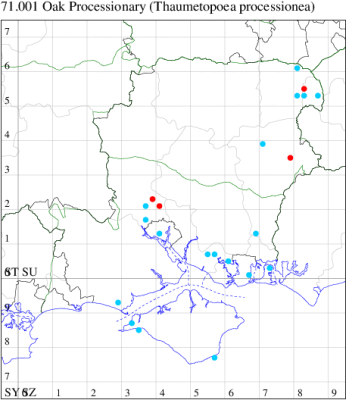2021 Annual Report for: Notodontidae / Thaumetopoeinae
For species seen in 2021 that had less than or equal to 100 records, full details are included; for more common species, the earliest, latest and highest count by vice-county are shown. The narrative for each species is taken from the main Hantsmoths website, and it is possible that some information on abundance and occurrence can get out of date, as it is impossible to keep up with all changes; however it should give a good introduction to each species. The tables in each species account summarise the previous status, and that for the current year.
For the maps, all records prior to 2021 are shown by a blue dot (the larger the dot, the more recent), with the current year's records shown in red. As previous records are superimposed on any report for 2021, new sites have greater emphasis (i.e. will show as 'more red').
In the species accounts, an asterisk next to a location indicates a new 10km square record; earliest ever dates are highlighted in orange, and latest ever in red. Initials in the species accounts refer to the recorders listed here. Please get in touch if you identify any omissions or errors, in particular if you have records that have yet to be submitted. Details of how to submit records can be found here.
71.001 [B&F: 2022] Oak Processionary Thaumetopoea processionea (Linnaeus, 1758) - Naturalised
Rare immigrant from mainland Europe, appearing in southern England. It is expanding its range on the continent and is resident on the Channel Islands, and likely to be reported with increased frequency. While the Moths of Hampshire and Isle of Wight (Goater & Norriss, 2001) states "15 or so records of this species (all males), since the first in 1983" this account must be erroneous as the relevant atlas map shows no dots for the county and there are no reports on the county database from mainland Hampshire before two on consecutive days in mid-2004. On the Isle of Wight, reported for the first time in September 1998. The year 2020 saw a considerable increase in numbers and expansion of range, particularly into the north-east of Hampshire and Isle of Wight, with at least 26 individuals being reported. Wingspan male 31-35 mm, female 36-41 mm. Similar to Pine Processionary T. pityocampa, but has smaller and weaker comma-shaped marking in the centre of the forewing. Larva feeds on Sessile Oak, Pedunculate Oak, Turkey Oak and Evergreen Oak, living gregariously within a silken web.
Records prior to 2021
| Vice County | #Records | #Individuals | First Record | Last Record |
|---|---|---|---|---|
| 10 | 8 | 11 | 1998 | 2020 |
| 11 | 12 | 9 | 2004 | 2020 |
| 12 | 9 | 13 | 2020 | 2020 |
2021 records
| Vice County | #Records | #Individuals | Max Quantity |
|---|---|---|---|
| 11 | 3 | 4 | 2 |
| 12 | 2 | 2 | 1 |

Records by year
Records by week (adult)
Records by week (larval)
Record Details
VC11: Romsey, one, 02 Sep; two, 06 Sep (NRJ); Chandlers Ford, one, 06 Sep (BEll);
VC12: Whitehill*, one, 28 Aug (ASto); Farnborough*, one, 28 Aug (MThop)